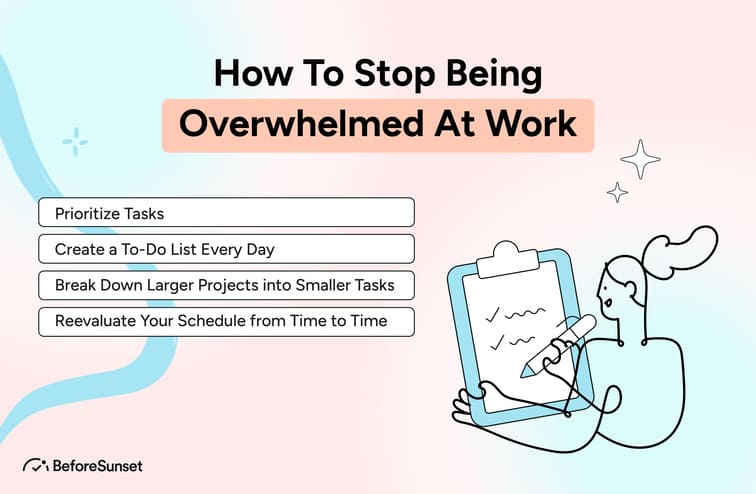Even the most skilled people sometimes feel overburdened and emotionally exhausted due to the constant stream of obligations. But it's important to keep in mind that feeling overwhelmed is a difficulty that can be handled and overcome with the appropriate approaches and mentality.
We will find a plethora of insights and doable measures to help you recover control over your workload and your life, from helpful time management skills and stress-reduction strategies to cultivating a friendly work environment and nourishing personal well-being.
We may work toward a more balanced, contented, and long-lasting professional path by proactively addressing and reducing overload. Let's set out on this adventure together to discover the methods and insights that may turn professional overload into a chance for development, toughness, and personal well-being.

Symptoms of Overwhelm at Work
Workplace overwhelm may appear in many different ways, and each worker will experience it differently. Typical signs of being overburdened at work include:
Stress: Elevated stress is one of the main signs of overload. The responsibilities of your job may cause you to feel tense, worried, or on edge all the time.
Fatigue: Overwhelm frequently results in both physical and mental tiredness. Even after a full night of sleep, you could always feel exhausted.
Irritability: Being overburdened might make you more quickly aggravated or frustrated, both with colleagues and with duties that you ordinarily wouldn't mind.
Concentration Issues: Being overburdened might make it difficult to concentrate on duties. You can experience daydreaming or have trouble finishing even straightforward assignments.
Procrastination: Some people use avoidance or procrastination as a coping mechanism for being overwhelmed, which can increase stress as deadlines draw near.
Physical Signs: Physical signs of overwhelm include headaches, muscular tightness, stomachaches, and even chest discomfort.
Reduced Productivity: You could observe a drop in your general effectiveness and productivity at work. Previously easier tasks could suddenly need more effort.
Reduced Work Quality: Being overwhelmed can cause mistakes and a decline in your work quality, which can make you more stressed as you worry about the repercussions.
Withdrawal: Some people turn inside when they feel overpowered. You could withdraw from coworkers or refrain from social contact.
Sleeping Problems: Stress can interfere with your sleep cycle, causing insomnia or poor-quality sleep.
Feeling Overburdened: You can frequently feel as if you have too much on your plate and are unable to keep up with your tasks.
Emotional Reactions: Feeling overwhelmed may cause you to experience emotions like annoyance, rage, sadness, or even tears at work.
Physical Health Issues: Prolonged overload can eventually lead to more severe health difficulties, such as immune system deterioration, cardiovascular problems, and mental health diseases including anxiety or depression.
Changes in Appetite: As a reaction to overload, some people may experience changes in appetite, such as overeating or lack of appetite.
Impact on Mental Health
At times, the constant barrage of obligations, due dates, and duties can make us feel as though we're drowning in a sea of obligations. However, the serious effects that work-related overload may have on our mental health are frequently overlooked.
Our mental health is a delicate balance that is vulnerable to the pressures and demands of daily life, especially in the workplace. Workplace stress may infiltrate into the very foundation of our mental health and have long-lasting effects that go well beyond the confines of the office when it is severe and unremitting.
The effects of workplace overwhelm are clear, ranging from elevated stress and anxiety to feelings of powerlessness and burnout.
Short-Term Effects
One's mental health may suffer immediately and noticeably if they are overworked. High demands and severe pressure can cause increased stress, which can result in symptoms including impatience, anxiety, and problems concentrating.
Physical pain, such as headaches and irregular sleep patterns, might be a result of these stress reactions. Decision-making skills might deteriorate and irritation or even tears could increase in frequency. Procrastination or dietary modifications are examples of short-term coping strategies that might make things worse.
It is crucial to detect and handle overload at work as it develops since these short-term impacts not only compromise one's immediate well-being but, if not appropriately treated, can also pave the way for long-term mental health issues.

Long-Term Effects
Chronic overload at work can have long-term negative impacts on a person's mental health. Chronic anxiety and depression can result from prolonged exposure to high levels of stress and strain. Finding enjoyment or drive in one's job might be tough due to burnout, a state of mental and emotional tiredness.
Relationships might suffer as a result of irritation and emotional instability, both in and outside of the job. Chronic stress has been related to a number of diseases, such as heart disease and decreased immunity, so physical health can also suffer.
Overall, the long-term effects of workplace overload can harm one's mental health, resulting in problems that take a long time and a lot of work to address and recover from.
Tips to Manage Overwhelm at Work
Even the most robust people often feel overburdened by the continual juggling of obligations, deadlines, and duties. However, it's crucial to understand that overwhelm is a difficulty that may be overcome with sensible tactics and coping techniques rather than an inevitable occurrence. The ability to control overload at work is essential for maintaining one's mental and emotional health as well as productivity.
Prioritize Tasks
The art of structuring your to-do list methodically based on items' relative priority and due dates will help you use your time and energy more wisely. It entails classifying each work in accordance with its importance as well as how it will affect your goals and obligations.
By doing this, you may separate urgent, high-priority jobs from those that are less important, allowing you to handle the most important chores first while effectively managing your workload.
Effective prioritizing helps you keep focused on important goals, fulfill deadlines, and retain a sense of control over your work, eventually minimizing the sensation of being overwhelmed. It also helps you minimize stress.

Break Down Larger Projects into Smaller Tasks
A smart method for handling difficult jobs is to divide major projects into smaller assignments. It entails breaking down a large project into smaller, more manageable components or milestones. This strategy accomplishes a number of goals: it lessens the project's sense of intimidation, offers a clear path for advancement, and enables better work delegation and planning.
It is simpler to assess progress and keep motivation high when minor tasks are turned into precise goals with their own timelines.
Individuals or teams can work methodically and effectively, ensuring that they make consistent progress toward the project completion while avoiding the emotions of being overwhelmed by the sheer breadth of the task, by breaking a project down into manageable portions.
Create a To-Do List Every Day
A straightforward yet effective habit for increasing productivity and maintaining organization is making a to-do list every day. It entails creating a list of things that need to get done on a certain day, including priorities, goals, and tasks.
This method has several advantages, including aiding in objective clarification, time management, and preventing the neglect of crucial activities. A well-organized to-do list offers a clear schedule for the day, making it simpler to remain on goal, successfully manage time, and feel accomplished when chores are finished.
Additionally, dividing a day's obligations into manageable chunks helps lessen feelings of overwhelm and enable a more focused and stress-free approach to work and life.
Take Regular Breaks Throughout the Day and Weekends Off
For preserving general well-being and sustaining productivity, taking regular breaks during the workday and taking the weekends off are essential. By avoiding burnout and mental exhaustion, brief, regular breaks during the workday can improve focus, creativity, and overall job quality.
These breaks provide people a chance to rest, move around, and concentrate, eventually improving their performance. A normal workweek with weekends off must also be followed in order to achieve work-life balance.
It gives people set aside time for leisure activities, quality time with family and friends, and the pursuit of personal interests or hobbies—activities that are essential for mental and emotional well-being. In addition to preventing burnout and stress-related health problems, a healthy balance between work and relaxation encourages sustainable long-term productivity and job satisfaction.

Set Boundaries with Your Job Description and Hours Worked Per Day/Week
Maintaining a good work-life balance and protecting your emotional and physical well-being requires setting limits with regard to your job description and working hours. By clearly outlining your job duties, you may avoid overload and burnout by concentrating on activities that are in line with your role and area of competence.
Furthermore, having set working hours each day and each week enables you to set aside time for both your business and personal lives. It keeps you from working too much and guarantees that you have time for leisure, self-care, and hobbies outside of work.
Setting boundaries is essential for safeguarding your physical and emotional well-being, creating a supportive work environment, and sustaining long-term productivity.
Make Time for Self-Care and Relaxation During Periods of Stressful Times
During times of high stress, scheduling time for self-care and relaxation is not a luxury but a need. It's simple to put one's well-being on the back burner when faced with enormous problems, yet doing so can increase stress and have a detrimental effect on one's mental and physical health.
Recharging your mental and emotional batteries requires taking breaks, doing self-care activities like exercise, meditation, or hobbies, and getting enough sleep. These techniques can lower stress hormone levels, increase attention and resilience, and keep you in balance even when things are difficult.
Making self-care a priority is both an act of self-compassion and a calculated move for more successfully navigating difficult situations, eventually improving your capacity to manage and come up with workable solutions.
Reevaluate Your Schedule from Time to Time
Reassessing your calendar sometimes is a proactive way to keep up productivity and well-being. It's important to frequently evaluate if your schedule fits with your current objectives and goals because life is dynamic and circumstances might change.
By doing this, you may spot inefficiencies, modify your job to fit your capabilities, and make sure your time is being used effectively. Through this method, you may also identify times when you could be ignoring important tasks or overcommitting yourself, allowing you to make the appropriate modifications to avoid burnout and overload.
By routinely reviewing your calendar, you may maintain your flexibility and responsiveness to both work and personal needs, fostering a healthy work-life balance and increasing overall performance.

Talk to a Colleague or Manager About Feeling Overwhelmed
Finding support and answers at work begins with starting a dialogue about feeling overburdened with a coworker or management. By communicating your emotions of overload, you might assist your coworker or boss in comprehending the difficulties you're dealing with and how they can affect your performance and well-being.
It gives them the opportunity to help in ways like task redistribution, deadline modification, or time management advice. Additionally, talking about your emotions at work helps foster a friendly and sympathetic workplace where problems are resolved together.
It's crucial to approach these discussions with a clear, productive perspective, concentrating on problem-solving and identifying solutions that are advantageous to you as well as the company.
Should I Quit My Job If I Feel Overwhelmed At Work?
When you're feeling overwhelmed, choosing whether to quit your work or not is a big choice that has to be carefully thought through. At work, feeling overburdened can frequently occur, especially during times of increased effort or high stress. It's crucial to carefully assess your position before making such a choice.
Assess the root reasons for your overload first. Is it mostly brought on by transient variables like a busy time of year or a particular project with a short deadline? Or is it a persistent problem brought on by an unfavorable work environment, a heavy workload, or other factors? Knowing the underlying reasons will enable you to decide if the overwhelm is a transient problem that can be dealt with or a more permanent problem that needs more substantial changes.
Next, think about how being overwhelmed affects your physical and emotional well-being. Burnout, anxiety, and depression are just a few of the major health problems that can result from persistent stress and overwhelm. Prioritizing your health and looking into stress-reduction techniques is crucial if your well-being is seriously at risk. These strategies could or might not require quitting your work.
Analyze how fulfilled and satisfied you feel with your employment overall. If you try to deal with your emotions of overload but they don't go away, it can mean that you are no longer a suitable match for your present position. Examine the position to see if it fits with your beliefs, long-term professional ambitions, and desired work-life balance. If the response is constantly "no," it might be time to look into alternative employment options that better fit your requirements and career goals.
Also, take into account your financial security. Before quitting your work without a backup plan in place, be sure you have savings or other sources of income. Financial stability is essential, especially when changing jobs.
Before making a final choice, consider alternate employment opportunities. Having another work offer or opportunity might make the transition easier and reduce financial stress if you believe resigning is the right course of action.
To help you negotiate your thoughts and decisions, ask your friends, family, or a therapist for assistance. Throughout this process, they can offer insightful opinions, emotional support, and direction.

What Is Quiet Quitting Job?
When an employee disengages from their work and diminishes their effort and output without resigning formally, the phrase "quiet quitting" is used to characterize the scenario. In other words, it's a type of passive disengagement in which workers continue to physically report to work but emotionally and psychologically distance themselves from their duties.
Employees frequently experience this phenomenon when they feel underpaid, underappreciated, or overburdened, which causes them to progressively lose enthusiasm and drive for their work.
Some typical warning signals of silent resignation include:
Decreased productivity and quality of work.
A lack of enthusiasm or initiative.
Increased absenteeism or tardiness.
Reduced interaction with colleagues and supervisors.
Minimal effort to meet deadlines or fulfill job responsibilities.
A negative attitude towards work and the organization.
A sense of disconnection from the company's mission or goals.
Quitting quietly may be hazardous to one's health as well as the productivity of the company. It may result in decreased output, lowered team morale, and a rise in employee turnover. In order to avoid employee disengagement, employers should be alert to the warning signals of silent resignation and take proactive measures to address the underlying problems through open communication, support, and attempts to enhance working circumstances.
Do I Hate My Job or Am I Burnt Out?
Understanding your sentiments and acting appropriately may depend on your ability to distinguish between burnout and disliking your work. When you despise your job, it usually indicates that you have particular complaints about particular areas of your employment.
It might be the nature of your employment, difficult working relationships, or a misalignment with your professional objectives. These negative feelings may not necessarily transfer into general tiredness or despondency because they are frequently focused on specific job-related concerns. If there are specific aspects of your job that make you unhappy, rather than a broad sense of job misery, you may not be suffering burnout.
Burnout, on the other hand, frequently includes a more extensive and incapacitating experience. As a result of ongoing stress and unreasonable expectations at work, it frequently manifests over an extended period of time. In addition to being physically and emotionally worn out, burnout is often characterized by a developing feeling of cynicism and alienation from your career, coworkers, or even your personal life.
Burnout's impacts can affect every part of your life, including your work performance and general well-being. It's linked to a continual sense of being overburdened and emotionally exhausted, which frequently has a detrimental impact on one's health and results in physical diseases, despair, and anxiety.
Are You Overwhelmed At Work? Use BeforeSunset AI
BeforeSunset AI by enhancing efficiency and providing clarity in task management, productivity software can help individuals regain control over their work, reduce stress, and ultimately achieve a better work-life balance.


